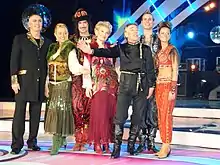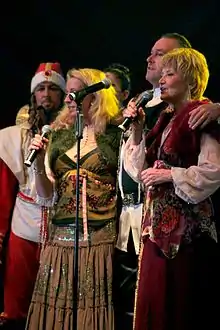Dschinghis Khan
Dschinghis Khan (known in some countries as Genghis Khan)[3][4][5][6] is a German Euro disco pop band. It was originally formed in Munich[7] in 1979[8] to compete in the Eurovision Song Contest[9] with their song "Dschinghis Khan". In 2018, there have been two groups with the name: the one led by original members Henriette Strobel and Edina Pop, and a more current group led by original member Wolfgang Heichel and Stefan Track, who replaced the late Louis Potgieter in the 2005 reunion concert.
Dschinghis Khan | |
|---|---|
 Moscow reunion concert 2005 | |
| Background information | |
| Origin | Munich, West Germany |
| Genres | Disco, pop, Euro disco[1] |
| Years active | 1979–1985,[2] 2005–present |
| Labels | Jupiter Records |
| Members | Wolfgang Heichel Stefan Track Henriette Strobel Edina Pop (Marika Késmárky) Claus Kupreit Angelika Erlacher Lam Virat Phetnoi |
| Past members | Steve Bender (deceased) Louis Hendrik Potgieter (deceased) Leslie Mándoki Johannes Kupreit (deceased) |
Beginning: 1970s–80s
The band was formed and managed by German producer Ralph Siegel. Their original eponymous song was written and produced by Ralph Siegel with lyrics by Bernd Meinunger and came in fourth place at the 1979 Eurovision Song Contest in Jerusalem. Their name is the German spelling of the name of the historical figure Genghis Khan of the Mongol Empire.
The only native Germans in the group were the bald-headed Karl-Heinz "Steve" Bender, and Wolfgang Heichel, who brought his Dutch-born wife Henriette (née Strobel) with him. Louis Hendrik Potgieter (Genghis Khan) was South African. Edina Pop (Marika Késmárky) was a Hungarian who had started her singing career in West Germany in 1969. Leslie Mándoki, also Hungarian, had left Hungary in 1975.
In 1979, the band released the singles "Dschinghis-Khan"[10] and "Moskau". In 1980, its English-language version topped the charts in Australia for six weeks,[11] largely thanks to Seven Network using the song as the theme music for coverage of the 1980 Summer Olympics.
In an interview with Russian television presenter Alexandra Glotova, the producer of the group Dschinghis Khan, Heinz Gross, said that in the 1980s, the band was banned in the Soviet Union and was accused of anti-communism and nationalism.[12]

The group broke up in 1984 but 1986 saw a brief reunion as Dschinghis Khan Family. Only Henriette Heichel (vocals), Leslie Mándoki (drums) and Louis Potgieter (keyboards) returned from the original lineup. The song "Wir gehör'n zusammen" led them to a national qualifying round of the Eurovision Song Contest, where they finished in second place.
Continued career: 1990s–present
Dancer and front man Louis Potgieter died of AIDS in 1994,[13] while singer Karl-Heinz "Steve" Bender died of cancer in 2006.[13] The success of the band eventually led to Wolfgang and Henriette's divorce, with Henriette reverting to her maiden name of Strobel.[14]
In 2005, the band members Wolfgang Heichel, Steve Bender, Henriette Strobel and Edina Pop started a "comeback" with a show at the Retro FM festival in the Olympic stadium in Moscow. Stefan Track came as new member to the band to replace Louis Hendrik Potgieter.
In 2018, they re-recorded their song "Moskau" with producer Ralph Siegel and singers Jay Khan, Alexander Malinin and Ustinya Malinin, Jorge Jiménez & Marifer Medrano for the 2018 FIFA World Cup.[15] In April 2018, original member Wolfgang Heichel and Stefan Track, fresh off his spin-off Rocking Son of Dschinghis Khan formed a new Dschinghis Khan after Heichel gained the rights to the name in Germany and Spain.[16] Henriette Strobel, Edina Pop, Claus Kupreit, and producer Heinz Gross also own the rights to the name Dschinghis Khan,[17] with both group patents revealing the use of a certain logo. Therefore, there are two disco groups with the name Dschinghis Khan.
Band members
Original members
- Edina Pop (born 4 February 1941 as Marika Késmárky in Budapest, Hungary) (1979–1985, 1995, 2005–present)
- Henriette Strobel (divorced Heichel) (born 13 November 1953 in Nieuwer Amstel, Netherlands) (1979–1985, 1986, 2005–present)
- Steve Bender (born 2 November 1946 as Karl-Heinz Bender in Mainz; died 7 May 2006 in München) (1979–1981, 1995, 2005-2006)
- Wolfgang Heichel (born 4 November 1950 in Meißen) (1979–1985, 2005–2014, 2018-, forming a new Dschinghis Khan)
- Leslie Mándoki (born 7 January 1953 as László Mándoki in Budapest, Hungary) (1979–1985, 1986, 1995)
- Louis Hendrik Potgieter (born 4 April 1951 in Pretoria, South Africa; died 12 November 1994 in Cape Town, South Africa)[18] (1979–1985, 1986)
Later members (selection)
- Stefan Track (born 15 September in Aalen, Germany) (2005-2006, 2018-, forming 2nd Dschinghis Khan with Heichel)
- Daniel Käsling (2005-2007, as Ögödei Khan)
- Kaya Ebru (エプル・カーヤ)(2005-2007, as Eltuya Khan)
- Claus Kupreit (2007–present, replaced Track and has since been Igei Khan and lead choreographer for Strobel and Pop's Dschinghis Khan)
- Angelika Erlacher (2016–present, Eltuya Khan in Strobel and Pop's Dschinghis Khan)
- Johannes Kupreit (2011–2020, Ögödei Khan in Strobel and Pop's Dschinghis Khan; died 12 September 2020)
- Läm Virat Phetnoi (2012–present, Yassa Khan in Strobel and Pop's Dschinghis Khan)
- Jan Großfeld (2019–present, Bärke Khan in Strobel and Pop's Dschinghis Khan)
Timeline

Discography
Albums
- Dschinghis Khan (1979)
- Rom (1980)
- Viva (1980)
- Re-release of Rom without bonus tracks.
- Wir sitzen alle im selben Boot (1981)
- Helden, Schurken & der Dudelmoser (1982)
- Corrida (1983)
- Huh Hah Dschinghis Khan - Ihre Grössten Erfolge (1993)
- Die Großen Erfolge (1999)
- Star Collection (2002)
- Jubilee (2004)
- 7 Leben (2007)
- Here We Go (2021)
Singles
German releases
- "Dschinghis Khan" (1979)
- "Moskau" (1979)
- "Hadschi Halef Omar" (1979)
- "Rocking Son Of Dschinghis Khan" (1979)
- "Rom" (1980)
- "Samurai" (1980)
- "Machu Picchu" (1980)
- "Pistolero" (1981)
- "Loreley" (1981)
- "Wir sitzen alle im selben Boot" (1981)
- "Klabautermann" (1982)
- "Der Dudelmoser" (1982)
- "Mata Hari" (1982)
- "Himalaja" (1983)
- "Rose Four María Magdalena" (1983)
- "Olé Olé" (1984)
Australian release
- "Moscow" (1980) (#1) (as Genghis Khan)
Dutch release
- "Kaboutertjes" (1982)
Japanese release
- "Dschinghis Khan Tartar Mix" by Dschinghis Khan×Berryz Kobo (2008) (#35)
South African release
- "Rome" by Dschinghis Khan (1981) (#14)[19]
References
- "Euro-Disco Music Artists". AllMusic.
- Last single was released in 1984
- "Country=France, Genghis Khan* - Moscow (Vinyl)". Discogs website. Retrieved 1 January 2014.
- "Country=Brazil, Genghis Khan*- Moskau (Vinyl)". Discogs website. Retrieved 1 January 2014.
- "Country=Colombia, Genghis Khan* - Moscu (Vinyl)". Discogs website. Retrieved 1 January 2014.
- "Country=Japan, Genghis Khan* - Moskau / Rocking Son Of Dschinghis Khan (Vinyl)". Discogs website. Retrieved 1 January 2014.
- "Talent in Germany 82: Bringing Home". Billboard. December 26, 1981. Retrieved January 13, 2017.
- http://www.discogs.com/ja/artist/407103-Dschinghis-Khan
- Genghis Khan Discography at Discogs
- "Dschinghis khan", Rate your music.
- "The biggest hits that never made No. 1 in Australia". Herald Sun. 2 January 2014. Retrieved 1 January 2014.
- Interview of the band Dschinghis Khan to Russian national channel TV Center on YouTube
- "History". Dschinghis Khan. Retrieved 2017-11-26.
- Dschinghis Khan Interview with English Subtitles (Part 1) on YouTube
- Welt.de
- "Deutsches Patent und Markenamt". 2017-08-05. Retrieved 2018-10-24.
- "Deutsches Patent und Markenamt". 2018-05-04. Retrieved 2018-10-24.
- Potgieters Sterbedatum auf der Steppenwind-Fanpage, abgerufen 8. Juli 2016
- "South African Rock Lists Website - SA Charts 1969 - 1989 Acts (D)". Retrieved 1 January 2014.
External links
- Dschinghiskhan.com Official Website
- Official Site (Wolfgang Heichel and Stefan Track)
- Official Site (Henriette Strobel and Edina Pop)
- Site fan français
| Preceded by Ireen Sheer with "Feuer" |
Germany in the Eurovision Song Contest 1979 |
Succeeded by Katja Ebstein with "Theater" |